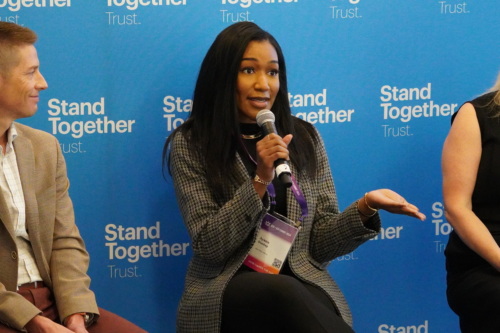
A Mentor’s Role in a Learner’s Life
A career mentor’s role in a student’s life is highly significant. A mentor is someone who guides a learner throughout their journey to break the barriers that might stand in their way to success.
Per Scholas offers supplemental mentorship to all its learners in addition to their training. Our mentors are career coaches, financial coaches, and instructors, all of whom believe that maintaining an open line of communication with our learners is essential to their success. But how exactly are mentors influencing our learners’ experiences not only during their time at Per Scholas but also after graduating? How are our learners prepared to navigate a job market that grows continuously and becomes more demanding every day? Hear from some of our Per Scholas’ mentors about the benefits, activities, and advice for career success.
How Mentors Help Learners
One of the many ways a career mentor can help our learners is by ensuring that they are equipped with proper knowledge and skills necessary to be marketable in the workforce, as well as enhance confidence in areas that learners might feel incompetent in, and accommodate time outside traditional class to provide a more personal learning experience.

Mentorship can be as broad or as specific as learners need it to be. One way Kelsey Briggs (Senior Manager, Career Solutions, Chicago) provides mentorship is by sharing information about job market opportunities in the area and also offering feedback to learners about their job search materials, networking, and communication skills.
“We guide them through their next career move, salary negotiation, and even when the right time is to move on to a new opportunity.”
It is also important to remember that the relationship between mentor and mentee, in this case, our learners, is a safe, free of judgment space, and encourages learners to share their personal challenges and create an effective plan of action. “I focus on mentoring my learners with my life expertise and best professional practices. I also hold one on one meetings with my learners, and together we create an effective plan to address them,” shares Jose Jurado (Senior Manager, Career Advancement, New York).
What to do as a Mentor
It is essential to understand what activities learners can participate in with their job mentors during the mentoring process. Our mentors in Boston and Detroit agree that having a set time to connect and check in regularly is fundamental to building a fruitful relationship between mentor and learner. Equally important is to talk openly. Honest feedback is one of the many benefits of mentorship. However, this can only be effective if there is an open communication line between the career mentor and the learner. As Kelsey Briggs explains: “As we get to know each other, we can offer information on how others might perceive us, how we could get ahead, or how we can reach our goals. The mentor/mentee relationship isn’t fixed, either. A strong relationship will have you sometimes offering advice and sometimes receiving it.”

Other suggested activities include role-playing, which can be beneficial during the interview process when looking for a job, setting reasonable expectations, providing career focus direction, and networking activities. Many other activities can be part of your job mentor’s relationship; these will depend on what you need, what you are looking for, and where you stand in your career at the time.
Sign up for our Monthly Impact Report
More News

Donate Now
Your support makes a powerful difference in our ability to build a technology talent training solution that creates greater access and equity.

